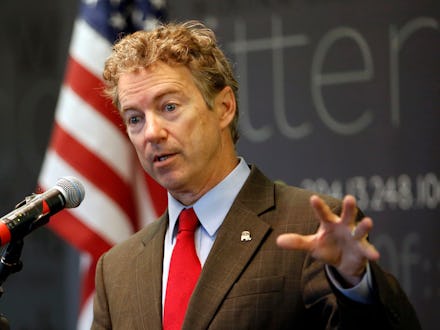Rand Paul Is the First Major Presidential Candidate to Accept Donations in Bitcoin

Kentucky Sen. Rand Paul, who is announcing his bid for president on Tuesday with a speech and a brand new website, bills himself as a "different kind of Republican." He wants you to know that, unlike other Republicans, he really means it when he says he stands for small government. He's willing to take controversial stands against the war on drugs and war in the Middle East.
And he's willing to accept your contribution in bitcoins.
Unlike any of the other major Republican presidential hopefuls for 2016, Paul's campaign accepts bitcoin donations. The digital currency created in 2009 allows financial transactions to be made without the involvement of banks or other third parties.
Here's what you'll find if you go to make a donation on randpaul.com:
After clicking "Make Donation," you're brought to this page, where the amount of bitcoin equal to $20.16 (get it?) is calculated:
Bitcoin, which is popular in the libertarian community that Paul affiliates with, remain an enigma to broad swaths of the public, but it has continued to gain legitimacy as a form of currency. In 2014, the Federal Election Commission ruled that political committees and candidates could accept bitcoin, as long as the donations were held up to the same standards of transparency as other kinds of donations.
The FEC's 2014 decision raised as many questions as it answered about the regulation of bitcoin in political contributions, but the new regulations didn't result in a deluge of bitcoin donations. In 2014, candidates who took the currency said "total bitcoin donations were small to nonexistent," according to the Huffington Post.
As of now, there's not much to suggest that 2016 will be very different. Bitcoin hasn't gained much traction with the mainstream — while the number of merchants accepting bitcoin have increased dramatically in the past year, retail purchases using the currency have not risen significantly.
If Paul has his way, that could change with this election cycle.